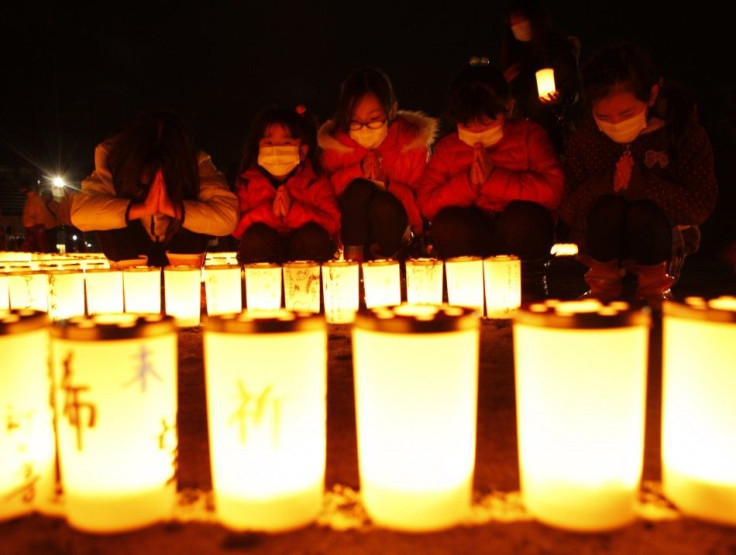Japan Marks First Anniversary of Tsunami with Prayers

With a minute of silence, prayers and anti-nuclear rallies, Japan marks on Sunday the first anniversary of an earthquake and tsunami that killed thousands and set off a radiation crisis that shattered public trust in atomic power and the nation's leaders.
A year after the magnitude 9.0 earthquake unleashed a wall of water that hit Japan's northeast coast, killing nearly 16,000 and leaving nearly 3,300 unaccounted for, the country is still grappling with the human, economic and political costs.
Along the coast, police and coastguard officers, urged on by families of the missing, still search rivers and shores for remains even though the chances of finding any would appear very slim.
In the port of Ofunato, hundreds of black-clad residents gathered at the town hall to lay white chrysanthemums at an altar dedicated to the town's 420 dead and missing.
I'm unable to wipe away the sense of regret of having lost my mother and wife because we underestimated the tsunami, said Kosei Chiba, 46, who owns a petrol station.
We can't just stay sad. Our mission is to face reality and move forward step by step. But the damage the town suffered was too big and our psychological scars are too deep. We need a long time to rebuild.
Like the rest of the country, Ofunato will observe a moment of silence at 2:46 pm (12.46 am EST) when the quake struck and then again, 33 minutes later when a 23-metre (75-foot) tsunami ripped through the town.
The Japanese people earned the world's admiration for their composure, discipline and resilience in the face of the disaster while its companies impressed with the speed with which they bounced back, mending torn supply chains.
As a result, the economy looks set to return to pre-disaster levels in coming months with the help of about $230 billion earmarked for a decade-long rebuilding effort agreed in rare cooperation between the government and the opposition.
In recent history, Japan seized rapid economic expansion from the ashes and desolation of World War Two, and we built the most energy-efficient economy in the world in the aftermath of the oil shock, Prime Minister Yoshihiko Noda said in an article published in the Washington Post.
On the anniversary of the Great East Japan Earthquake, we remember that today we face a challenge of similar proportions.
NO LEADERSHIP
Yet people are increasingly sceptical about whether the political establishment is up to the task.
Politicians and bureaucrats drew fire for the chaotic response to the crisis at the tsunami-wrecked Fukushima nuclear plant and their failure to seize the moment and tackle a myriad of ills that have dogged Japan for two decades.
After a brief truce, politicians resumed business as usual: parliamentary squabbles that gave Japan its sixth leader in five years and now threaten to block important tax and welfare reforms and stall progress in dealing with other business.
There is no leadership, said Hiroaki Oikawa, 56, another Ofunato resident who lost his two fish factories and his home.
There are no politicians to whom we can leave things.
Anti-nuclear demonstrations planned across the country for the anniversary also serve as a reminder that many want bolder action than the government's preferred scenario of a gradual reduction in reliance on nuclear power.
Not a single community has agreed to restart reactors taken off line since the disaster, meaning all of Japan's 54 reactors may be shut by the middle of the year.
Slow progress in drawing up plans for the tsunami and radiation tainted region is deepening the misery of survivors, about 326,000 of whom are still homeless, including 80,000 evacuated from the vicinity of the Fukushima plant.
While the government declared the plant's reactors had reached cold shutdown in December, its dismantling and the clean-up of an area the size of Luxembourg will take decades at an incalculable cost using technologies yet to be developed.
Taxpayers, facing proposed sales tax increases to help fund the country's debt, will need to cough up tens of billions of dollars to prop up Fukushima plant operator Tokyo Electric Power -- widely attacked for ignoring the possibility of a disaster and for what critics say has been arrogance since.
© Copyright Thomson Reuters {{Year}}. All rights reserved.





















